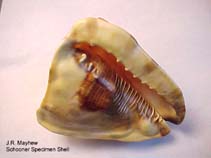Cassis tuberosa (Linnaeus, 1758)
King helmet| Native range | All suitable habitat | Point map | Year 2050 |

|
| This map was computer-generated and has not yet been reviewed. |
| Cassis tuberosa AquaMaps Data sources: GBIF OBIS |
Classification / Names Common names | Synonyms | CoL | ITIS | WoRMS
Gastropoda | Littorinimorpha | Cassidae
Environment: milieu / climate zone / depth range / distribution range Ecology
Reef-associated; depth range 0 - 27 m (Ref. 3446), usually 0 - 9 m (Ref. 3446). Tropical; 35°N - 18°S, 92°W - 25°W (Ref. 3446)
Distribution Countries | FAO areas | Ecosystems | Occurrences | Introductions
Western Atlantic.
Length at first maturity / Size / Weight / Age
Maturity: Lm ? range ? - ? cm Max length : 30.1 cm TL male/unsexed; (Ref. 3446); common length : 25.0 cm TL male/unsexed; (Ref. 355)
Short description Morphology
Life cycle and mating behavior Maturity | Reproduction | Spawning | Eggs | Fecundity | Larvae
Main reference
References | Coordinator | Collaborators
Leal, J.H. 2003 Gastropods. p. 99-147. In Carpenter, K.E. (ed.). The living marine resources of the Western Central Atlantic. Volume 1: Introduction, molluscs, crustaceans, hagfishes, sharks, batoid fishes, and chimaeras. FAO Species Identification Guide for Fishery Purposes and American Society of Ichthyologists and Herpetologists Special Publication No. 5. 1600p. (Ref. 355)
IUCN Red List Status
(Ref. 130435: Version 2025-1)
CITES status (Ref. 108899)
CMS (Ref. 116361)
Threat to humans
Human uses
Fisheries: commercial
| FishSource |
Tools
More information
Max. ages / sizes
Length-weight rel.
Length-length rel.
Length-frequencies
Mass conversion
Abundance
Internet sources
BHL | BOLD Systems | CISTI | DiscoverLife | FAO(Publication : search) | Fishipedia | GenBank (genome, nucleotide) | GloBI | Gomexsi | Google Books | Google Scholar | Google | PubMed | Tree of Life | Wikipedia (Go, Search) | Zoological Record



